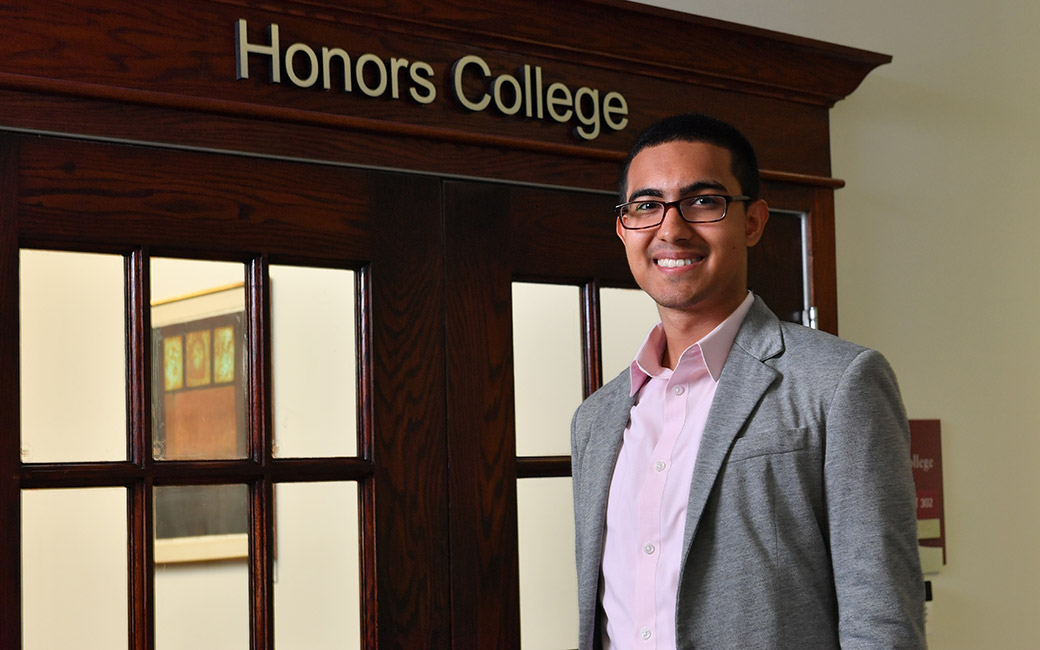The road to success
Metropolitan studies major found challenges, support in TU's Honors College
By Megan Bradshaw on May 18, 2018

As the son of a chief master sergeant in the U.S. Air Force, senior Christian Piñeiro traveled frequently as a child—by plane, train, boat and automobile.
Born in San Antonio, Texas, he lived in Japan, Alaska and Germany before he returned to the U.S. in 10th grade. Traveling widely with his family gave him the opportunity to observe cities’ geographies and transportation services, instilling in him a passion for studying transportation that crystallized his junior year of high school.
After his family settled into Silver Spring, Maryland, Piñeiro started looking at colleges.
“I’ve always been fascinated by geography, and I got to see a lot of European cities when I traveled around with my family while my dad was stationed abroad,” he said. “When I was looking at colleges, I really wanted a school that was close by, that wouldn’t put undue financial pressure on my family and offered my major. Towson University was a good fit.”
The metropolitan studies major found his way to the Honors College the winter of his sophomore year. A friend suggested he check it out, and after conversations with Honors staff and professors, Piñeiro applied and was admitted.
“I’ve always liked a challenge,” he said. “It’s important to me to take full advantage of my education, and Towson does such a great job connecting students and professors.”
Two of the professors he considers mentors are political science professors Eric Stokan and Alison McCartney, the Honors College faculty director.
“I connected with Professor Stokan over our shared passion for transportation and urban planning,” Piñeiro said. “I really thrived under his mentorship. Dr. McCartney was my adviser and I clicked with her—I really admire her professionally.”
Stokan wrote Piñeiro’s letter of recommendation for an internship with the U.S. Department of Transportation in Washington, D.C.
“It is refreshing to see a student who can excel academically, hold leadership positions within the university community and seek a life of public service,” said Stokan. “Christian embraces all three of these sentiments and you just know that he is going to excel in a way that improves society.”
Piñeiro chose his internship specifically to further his goal of going into public service.
“I chose to intern at the federal DoT because that’s where I want to work ultimately,” he said. “It matched my professional passions, and I had wonderful mentors there too.”
Piñeiro was a traffic records analyst for the National Highway Traffic Safety Organization, where he analyzed traffic safety data from all 50 states to identify trends and differences from previous years, while updating the organization’s five-year cyclical database.
As part of his internship, he synthesized the data he studied into a project titled “Smart city transportation: looking at the benefits of transit-oriented development and complete streets.
“Basically, it looked at making cities and streets friendlier for pedestrians,” he explained. “Having traveled in Europe and seen how they use trains, subways and other public transportation made me realize we don’t really do that in the U.S. My project looks at how to shift the mindset here from car-centric transportation.”
Piñeiro presented his project at a national conference for traffic safety officials in New Orleans as well as at the Celebration in Scholarship and Learning event hosted by the Honors College in fall 2018 and the TU environmental conference in April 2018.
His work also earned him third place in the internship category for TU’s Undergraduate Research Awards.
Piñeiro’s internship was just one of the requirements the Honors College sets for its students. Those who wish to graduate with the distinction of university scholar—as Piñeiro will—must complete their major requirements, core curriculum requirements, and Honors requirements. The Honors curriculum includes foundational units like Honors English, Honors-enhanced courses, and Honors upper-level seminars. Honors electives also incorporate advanced experiential learning options such as internships, study abroad, service-learning, and undergraduate research projects and theses, along with the public presentation of their experience at venues such as the Celebration of Scholarship and Learning poster conference. Students must also maintain a cumulative GPA of 3.3 overall and of 3.0 in Honors courses.
Even though being a member of the Honors College is an added responsibility to Piñeiro’s schedule—which also includes his work as the SGA’s director of civic engagement—he wouldn’t change a thing.
“It is truly a one of a kind educational experience,” he stressed. “You meet so many people with such different backgrounds—there’s a real uniqueness among Honors students. You’re always learning from each other.”
After graduation, Piñeiro is headed to Texas A&M University for a master’s degree in public service and administration at the George Bush School of Government and Public Service. McCartney sees big things ahead for him.
“Christian embodies all that we hope our Honors College students will achieve while at Towson,” she said. “He has pushed himself to take on academic challenges, rather than seek the easiest path, while also engaging in leadership development opportunities on and off campus. The solid track record of academic achievement and community service that he built here at Towson demonstrates that he is prepared for success after graduation.”